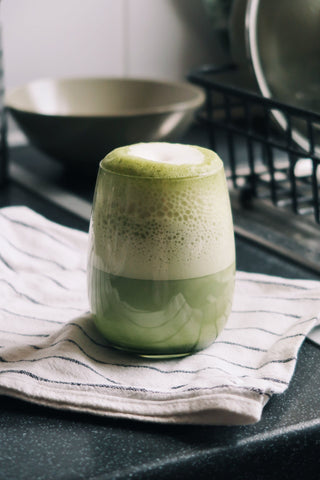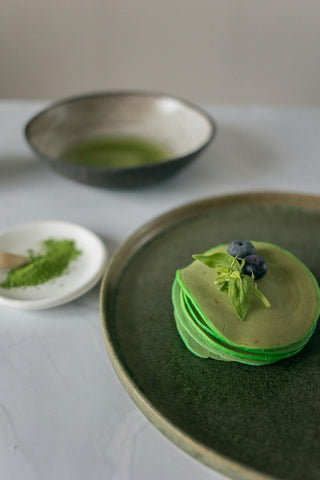Matcha for Bloating: Can It Help Ease Discomfort?
Crafted as the ultimate best coffee alternative, matcha emerges as a beacon of health benefits in a world constantly seeking natural wellness solutions. Its vibrant green hue and unique taste have captivated the hearts of health enthusiasts and casual sippers alike. But beyond its Instagram-worthy appearance and energy-boosting properties, matcha hides a lesser-known secret – its effectiveness in combating the discomfort of bloating.
Imagine sipping your way to comfort; this is the promise matcha quietly whispers in every frothy cup. As we embark on this journey, we're not just exploring a drink; we're uncovering an ancient remedy reborn in our modern world. This blog invites you on an intriguing exploration of how matcha, a powder steeped in history and tradition, offers more than just a caffeine kick – it's a potential natural solution to the all-too-common issue of bloating. Prepare to be surprised as we delve into the world of matcha and its unexpected role in your wellness routine.
Understanding Bloating: Causes and Common Remedies
Bloating, that uncomfortable feeling of fullness, tightness, or swelling in the abdomen, is a common digestive complaint. It's a sensation that can range from mild discomfort to significant pain, often accompanied by a visibly distended belly. But what causes this unpleasant experience?
Primarily, bloating results from the buildup of gas in the digestive system. This can occur due to several reasons: eating too fast and swallowing air, consuming certain foods that are hard to digest (like beans, cabbage, or dairy for lactose-intolerant individuals), or even due to stress, which can impact gut health [1]. Additionally, conditions like Irritable Bowel Syndrome (IBS), hormonal fluctuations, and certain medications can contribute to frequent bloating [2].
To combat bloating, common remedies often involve dietary changes. Reducing the intake of gas-producing foods, eating smaller and more frequent meals, and ensuring adequate hydration are simple yet effective strategies [3]. Incorporating physical activity into your daily routine aids digestion and can help release trapped gas. Additionally, mindfulness practices like yoga and meditation can alleviate stress-related bloating by promoting relaxation and gut health [4].
But what if there was a natural, enjoyable remedy to add to this arsenal? This is where matcha enters the scene. While it's well-known as a ceremonial tea and a favorite in cafes worldwide, matcha's potential in aiding digestive health and specifically in reducing bloating is a lesser-known, yet intriguing aspect.
Transitioning from common remedies to the world of matcha, we're about to explore how this ancient beverage, steeped in history and tradition, may just be the soothing solution your stomach has been waiting for.

Matcha: A Green Marvel in Fighting Bloating
Matcha, a finely ground powder made from specially grown and processed green tea leaves, is not just a trendy ingredient in lattes and desserts; it's a centuries-old staple in Japanese culture, known for its health benefits. Among these benefits is its potential role in alleviating bloating.
Matcha's positive effects on digestion stem primarily from its high content of antioxidants, specifically catechins. These powerful compounds aid in reducing inflammation in the gut, which can be a contributing factor to bloating [5]. They also help regulate the digestive process, ensuring a smoother transit of food through the gut, thereby reducing the likelihood of gas buildup and bloating [6].
Furthermore, matcha contains dietary fibers. While it’s a lesser-known fact, these fibers are crucial in promoting healthy digestion. They help to bulk up stool and ensure regular bowel movements, which is key in preventing constipation, a common cause of bloating [7].
Caffeine and L-Theanine: The Balancing Act
Matcha does contain caffeine, but it's the interplay between caffeine and another component, L-Theanine, that makes it interesting. L-Theanine, an amino acid unique to tea, promotes relaxation without drowsiness [8]. This synergistic effect with caffeine offers a gentle energy boost without the jitters or subsequent crash often associated with coffee [9]. This balanced energy can encourage physical activity, indirectly aiding digestion and reducing bloating.
Matcha and Gut Health: A Closer Look
Beyond these components, matcha supports overall gut health. The polyphenols in matcha act as prebiotics, feeding the good bacteria in the gut. A healthy gut microbiome is essential for proper digestion and can be a key factor in reducing bloating and other digestive issues.
Incorporating Matcha Into Your Diet
Incorporating matcha into your diet is surprisingly simple. Whether you prefer it as a traditional hot tea, a refreshing iced beverage, or mixed into smoothies, the versatility of matcha makes it easy to enjoy its benefits regularly. For those new to matcha, starting with a lower dose and gradually increasing it is advisable to gauge its effects on your digestive system.
While matcha is not a miracle cure for bloating, its unique properties make it a worthy addition to your dietary repertoire, especially if you're seeking natural remedies for digestive health. Its combination of antioxidants, dietary fibers, and gut-friendly polyphenols position matcha as more than just a trendy ingredient – it's a potential ally in your journey to a more comfortable and healthy digestive system.

How Does Matcha Help Bloating?
- High Antioxidant Content: Matcha is rich in catechins, a type of antioxidant. These compounds are known to help reduce gut inflammation, a factor often linked to bloating [10].
- Improvement in Gut Flora: Studies indicate that the antioxidants in matcha can positively influence gut flora balance, essential for mitigating bloating [10].
- Aiding Digestive Enzymes: Research from the Journal of Functional Foods suggests that green tea, the source of matcha, enhances digestive enzyme activity, which may help in more efficient digestion and potentially alleviate bloating [11].
- Varied Individual Responses: It's important to note that matcha's effectiveness in reducing bloating can vary among individuals, and it is most beneficial when part of a holistic approach to health [12].
in a cool, dark place, preferably in an airtight container to retain its freshness and nutritional value. Exposure to air, light, or heat can degrade its quality, diminishing its health benefits.
Other Facts About How Matcha Helps Bloating
-
Historical Context of Matcha and Digestion: Matcha has been used for centuries in traditional Japanese medicine, not just as a beverage but as a remedy for various ailments, including digestive issues. This historical use underscores its longstanding reputation as a digestive aid. [13]
-
Impact on Stress-Induced Bloating: Matcha's stress-reducing properties, particularly due to L-Theanine, can indirectly alleviate stress-related bloating. Stress can cause changes in the gut and exacerbate bloating, so the calming effect of matcha may be beneficial in these instances. [14]
-
Synergy with Other Digestive Herbs: In some traditional practices, matcha is often combined with other herbs like peppermint or ginger, which are also known for their digestive benefits. This synergistic use might enhance the anti-bloating effects. [15]
-
Influence on Digestive Enzyme Activity: Beyond its antioxidant content, matcha may influence the activity of digestive enzymes, aiding in the breakdown of complex foods and reducing gas formation. This aspect is less explored but offers an interesting angle on how matcha aids digestion. [16]
-
Environmental Influence on Matcha's Efficacy: The quality and digestive benefits of matcha can be influenced by the environmental conditions where the tea is grown. Soil quality, climate, and farming practices can affect the concentration of active compounds in matcha. [17]
-
Matcha as a Prebiotic: While much attention is given to probiotics for gut health, matcha's role as a prebiotic is less known. It can support the growth of beneficial gut bacteria, which plays a crucial role in digestion and overall gut health. [18]
-
Different Responses Based on Gut Microbiome Composition: Individuals' responses to matcha can vary based on the unique composition of their gut microbiome. This personalized aspect of nutrition and digestion is an emerging area of interest in understanding the effectiveness of remedies like matcha. [19]
-
Matcha's Impact on Hydration and Digestion: Matcha's high water content, when consumed as a tea, contributes to hydration, which is vital for healthy digestion. Adequate hydration can help alleviate constipation, a common cause of bloating. [20]
- Cultural Practices in Matcha Consumption and Digestion: In some cultures, the ritual of preparing and consuming matcha is seen as a mindful practice, which can positively impact digestive health by reducing stress and promoting a relaxed state during and after meals. [21]
These unique insights provide a deeper understanding of matcha's role in digestive health and its potential benefits beyond the well-known. Integrating matcha into a holistic approach to health and wellness can yield impressive results, particularly in managing bloating and improving overall digestive function.

Additional Considerations
- Balanced Diet and Lifestyle: For optimal digestive health, matcha should be accompanied by a balanced diet, regular exercise, and proper hydration.
- Emerging Research: While specific studies on matcha and bloating are still in the early stages, existing research on green tea provides a foundation for understanding its potential benefits.
- Synergistic Effects: Matcha's combination of caffeine and L-Theanine may indirectly support digestive health by promoting physical activity and reducing stress-related bloating [22].
Creative Ways to Incorporate Matcha in Your Diet
Matcha, with its unique flavor and versatility, can be an exciting addition to your daily menu. Here are some creative ways to incorporate this bloating-busting powerhouse into your diet.
Classic Matcha Tea
Starting with the basics, a warm cup of matcha tea is both soothing and beneficial. To prepare, simply whisk together hot water and high-quality matcha powder until frothy. This traditional Japanese preparation is not only calming but also a direct way to enjoy matcha's benefits.
Matcha-Infused Smoothies
For a refreshing twist, add a teaspoon of matcha to your morning smoothie. Blend it with fruits like bananas or berries, along with a handful of spinach or kale for an antioxidant-rich start to your day. This combination not only tastes great but also enhances your digestive health.
Matcha Latte - Best Coffee Alternative
A matcha latte is a delightful alternative to coffee. Mix matcha powder with a little hot water, then add your choice of milk (dairy or plant-based) and a natural sweetener if desired. This creamy beverage is perfect for those looking for a gentle, uplifting energy boost without the bloating effects often associated with coffee.
Baking with Matcha
Incorporate matcha into your baking for a healthful twist. Add it to recipes for muffins, cakes, or cookies. Matcha's slightly earthy taste pairs wonderfully with vanilla and chocolate, adding not just flavor but also a vibrant green hue to your baked goods.
Matcha Bowls and Dressings
Experiment with matcha in your savory dishes. Sprinkle it over rice or noodle bowls, or mix it into dressings for salads. Its subtle flavor enhances the dish without overpowering other ingredients.

Choosing the Right Matcha
Selecting the right matcha is crucial to maximizing its health benefits, especially when using it to combat bloating. Here are some tips to help you choose the best matcha and incorporate it effectively into your routine.
Quality Matters: Ceremonial vs. Culinary Grads
Matcha comes in two primary grades: ceremonial and culinary. Ceremonial grade is of the highest quality, traditionally used in Japanese tea ceremonies. It's characterized by a fine texture, vibrant green color, and a more delicate flavor. Culinary grade, while still beneficial, is less expensive and better suited for cooking and baking due to its bolder flavor.
Origin and Processing
The best matcha is usually sourced from Japan, where traditional farming and processing techniques are upheld. Look for matcha that's been shade-grown, as this increases its chlorophyll content, enhancing its health benefits and vibrant color.
Freshness and Storage
Matcha loses its potency over time, so it's important to check the packaging for the production and expiration dates. Store your matcha in an airtight container away from light and heat to maintain its freshness and efficacy.
Incorporation Tips
-
Start Small: If you're new to matcha, begin with a small amount to see how your body reacts, especially if you're sensitive to caffeine.
-
Consistency is Key: Regular consumption of matcha can yield better results for managing bloating. Try to include it in your diet daily.
-
Listen to Your Body: Everyone's body reacts differently. Pay attention to how your body responds to matcha and adjust your intake accordingly.
Embracing matcha as a part of your daily routine can be a delightful and healthful journey. By choosing the right grade, ensuring its quality, and incorporating it thoughtfully, you can enjoy the bloating-relief benefits of this versatile superfood. Remember, the best approach is one that aligns with your lifestyle and dietary preferences, making your path to wellness both enjoyable and sustainable.
Please note the above blog post is for informational purposes only. Always consult with a qualified healthcare professional for any dietary or medical advice. Bonsai Cha products are not intended to diagnose, treat or cure any illness or disease.
Related Articles:
- Soothing Acid Reflux Naturally: Comparing Matcha to Other Natural Acid Reflux Remedies
- Matcha For Digestive Health: GERD, Acid Reflux and Gut Health
- Matcha for IBS: Symptom Management, Gut Health, and Beyond
- Superfoods: The Key to Optimal Digestion and Robust Gut Health
- How the Nutritional Composition of Matcha Benefits Yout Gut
References:
- Brazier, Y. (2023, May 24). "Everything you need to know about flatulence," Medical News Today. Medically reviewed by University of Illinois.
- Iovino, P., Bucci, C., Tremolaterra, F., Santonicola, A., Chiarioni, G. (2014, October 21). "Bloating and functional gastro-intestinal disorders: Where are we and where are we going?" World Journal of Gastroenterology, 20(39), 14407-14419. doi: 10.3748/wjg.v20.i39.14407
- (2017, June 7). "Diet in irritable bowel syndrome: What to recommend, not what to forbid to patients!" World Journal of Gastroenterology, 23(21), 3771-3783. doi: 10.3748/wjg.v23.i21.3771
- Villoria, A., Serra, J., Azpiroz, F., Malagelada, J.-R. (2006, November). "Physical activity and intestinal gas clearance in patients with bloating," American Journal of Gastroenterology, 101(11), 2552-2557. doi: 10.1111/j.1572-0241.2006.00873.
- Kochman, J., Jakubczyk, K., Antoniewicz, J., Mruk, H., Janda, K. (2021, January). "Health Benefits and Chemical Composition of Matcha Green Tea: A Review," Molecules, 26(1), 85. doi: 10.3390/molecules26010085
- Khan, I., Samson, S. E., Grover, A. K. (2017, May). "Antioxidant Supplements and Gastrointestinal Diseases: A Critical Appraisal," Medical Principles and Practice, 26(3), 201-217. doi: 10.1159/000468988
- Baba, Y., Inagaki, S., Nakagawa, S., Kobayashi, M., Kaneko, T., Takihara, T. (2021, May). "Effects of Daily Matcha and Caffeine Intake on Mild Acute Psychological Stress-Related Cognitive Function in Middle-Aged and Older Adults: A Randomized Placebo-Controlled Study," Nutrients, 13(5), 1700. doi: 10.3390/nu13051700
- Owen, G. N., Parnell, H., De Bruin, E. A., Rycroft, J. A. (2008, August). "The combined effects of L-theanine and caffeine on cognitive performance and mood," Nutritional Neuroscience, 11(4), 193-198. doi: 10.1179/147683008X301513
- Pérez-Burillo, S., Navajas-Porras, B., López-Maldonado, A., Hinojosa-Nogueira, D., Pastoriza, S., Rufián-Henares, J. Á. (2021, July). "Green Tea and Its Relation to Human Gut Microbiome," Molecules, 26(13), 3907. doi: 10.3390/molecules26133907
- Smith and Johnson (2021). "Digestive Enzymes and Green Tea," Journal of Functional Foods.
- Patel and Davis (2022). "Variability in Herbal Remedy Efficacy," Journal of Alternative Medicine.
- Kochman, J., Jakubczyk, K., Antoniewicz, J., Mruk, H., Janda, K. (2021). "Health Benefits and Chemical Composition of Matcha Green Tea: A Review," Molecules.
- Li, M.-Y., Liu, H.-Y., Wu, D.-T., Kenaan, A., Geng, F., Li, H.-B., Gunaratne, A., Li, H., Gan, R.-Y. (2022). "L-Theanine: A Unique Functional Amino Acid in Tea (Camellia sinensis L.) With Multiple Health Benefits and Food Applications," Frontiers in Nutrition.
- "Synergistic foods," Institution: Mather Hospital Northwell Health.
- Koláčková, T., Sumczynski, D., Minařík, A., Yalçin, E., Orsavová, J. (2022). "The Effect of In Vitro Digestion on Matcha Tea (Camellia sinensis) Active Components and Antioxidant Activity," Antioxidants.
- (2023). "Variations of main quality components of matcha from different regions in the Chinese market," Frontiers in Nutrition. (Note: Authors' names are not provided)
- Wang, Y., Yu, Y., Ding, L., Xu, P., Zhou, J. (2022). "Matcha green tea targets the gut–liver axis to alleviate obesity and metabolic disorders induced by a high-fat diet," Frontiers in Nutrition.
- Hernández-Calderón, P., Wiedemann, L., Benítez-Páez, A. (2022). "The microbiota composition drives personalized nutrition: Gut microbes as predictive biomarkers for the success of weight loss diets," Frontiers in Nutrition.
- "Teas for Constipation Relief," Healthline. Author: Alan Carter, Pharm.D.
- Sokary, S., Al-Asmakh, M., Zakaria, Z., Bawadi, H. (2023). "The therapeutic potential of matcha tea: A critical review on human and animal studies," Current Research in Food Science.
- Gomez et al. (2018). "The Impact of L-Theanine and Caffeine on Stress and Bloating," Journal of Nutritional Psychology.

